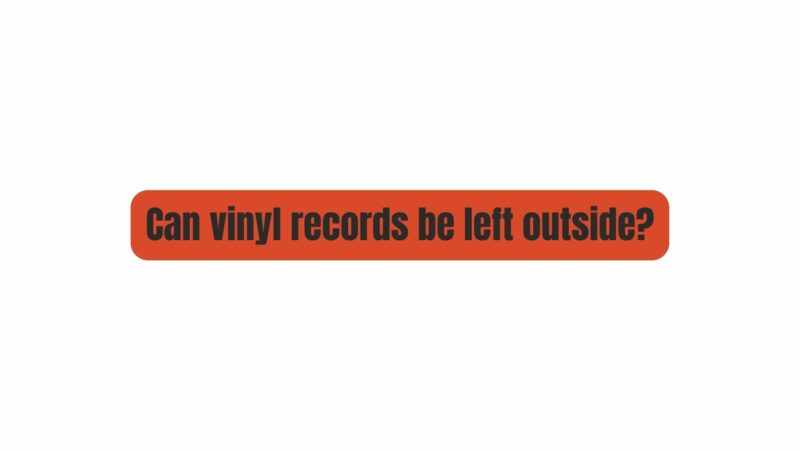In today’s digital age, vinyl records have made a remarkable comeback. Audiophiles and music enthusiasts alike appreciate the warm, analog sound of vinyl, making it a cherished medium for listening to music. However, one question that often arises is whether vinyl records can be left outside. As much as we love the great outdoors, exposing vinyl records to the elements can have detrimental effects on their quality and longevity. In this comprehensive guide, we will explore the impact of outdoor exposure on vinyl records, discuss the factors that influence their durability, and offer practical tips on how to protect your cherished vinyl collection.
Understanding Vinyl Records
Before delving into the question of leaving vinyl records outside, it’s essential to understand what vinyl records are made of and how they work.
- Composition of Vinyl Records
Vinyl records are typically made from a compound known as polyvinyl chloride (PVC). PVC is a type of plastic that is both durable and flexible, making it an ideal material for records. A thin, flat disc of PVC is used as the base for a vinyl record. The surface of the record contains microscopic grooves that store the audio information in the form of analog signals.
- How Vinyl Records Play
To play a vinyl record, a turntable is used. The stylus, or needle, is placed at the beginning of the grooves, and as the record spins, the stylus follows the grooves, converting the analog signals into sound waves. This process gives vinyl records their characteristic warm and rich sound.
The Impact of Outdoor Exposure
Now that we understand the composition and functioning of vinyl records, let’s explore how outdoor exposure can affect them.
- Temperature Fluctuations
One of the primary concerns when leaving vinyl records outside is temperature fluctuations. Vinyl records are sensitive to extreme heat and cold. Prolonged exposure to high temperatures can cause the record to warp, making it unplayable. Conversely, extreme cold can make the vinyl brittle and prone to cracking.
- Humidity and Moisture
Humidity and moisture are other significant factors to consider. Vinyl records are susceptible to warping and mold growth when exposed to high humidity. Even moderate humidity can lead to the deterioration of the record’s cardboard jacket and paper labels. Additionally, rain or accidental exposure to water can cause irreversible damage to both the record and its cover.
- Sunlight and UV Radiation
Vinyl records are also sensitive to sunlight and ultraviolet (UV) radiation. Prolonged exposure to direct sunlight can lead to the fading of album covers and labels. Furthermore, UV radiation can degrade the PVC material itself, causing the grooves to become distorted and affecting the playback quality.
- Dust and Debris
Leaving vinyl records outside exposes them to dust, dirt, and other debris. These particles can settle on the record’s surface, causing scratching and affecting sound quality. The stylus can also pick up these particles, leading to damage to both the record and the turntable’s needle.
Factors That Influence Vinyl Record Durability
Several factors influence how vinyl records withstand outdoor exposure:
- Record Quality
The quality of the vinyl record itself plays a significant role in its durability. Higher-quality records are less prone to warping and damage than lower-quality ones.
- Storage Conditions
Proper storage conditions, both indoors and outdoors, can make a substantial difference. Records stored in a cool, dry, and clean environment are less likely to suffer damage when exposed to the elements.
- Record Sleeves and Jackets
The protective sleeves and jackets used for vinyl records can provide an additional layer of defense against outdoor elements. Properly designed and well-maintained sleeves can help shield records from dust, moisture, and UV radiation.
Tips for Protecting Vinyl Records
While it’s generally advisable not to leave vinyl records outside, there are some steps you can take to protect your collection if you must store them in an outdoor setting:
- Invest in High-Quality Storage Solutions
Consider investing in high-quality storage solutions designed for outdoor use. These may include weather-resistant storage boxes or cabinets that can shield your records from rain, sunlight, and temperature fluctuations.
- Use Protective Sleeves
Place your vinyl records in protective polyethylene or polypropylene sleeves, which are resistant to moisture and dust. Ensure that the sleeves are sealed to keep out contaminants.
- Store Records Vertically
Store your records vertically, as this reduces the risk of warping. Storing them horizontally can lead to uneven pressure on the records and result in deformation.
- Keep Records Clean
Regularly clean your vinyl records to prevent dust and debris from accumulating on the surface. Use a soft brush or an antistatic brush to remove particles.
- Maintain Proper Humidity Levels
If possible, maintain proper humidity levels in your outdoor storage area to prevent excessive moisture buildup. A dehumidifier can help regulate humidity.
- Rotate Your Collection
Rotate your vinyl records regularly to prevent them from sitting in the same position for an extended period. This can help distribute any potential warping stress more evenly.
Conclusion
While vinyl records are resilient and can provide decades of listening enjoyment when cared for properly, leaving them outside is not advisable. The elements, including temperature fluctuations, humidity, UV radiation, and dust, can have a detrimental impact on your cherished collection. To ensure the longevity and quality of your vinyl records, store them in a controlled indoor environment, use protective sleeves, and follow the tips provided in this guide. By taking these precautions, you can continue to enjoy the warm and nostalgic sound of vinyl for years to come.


